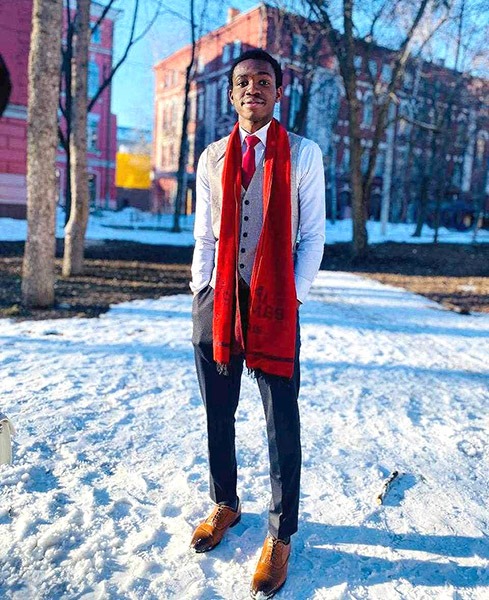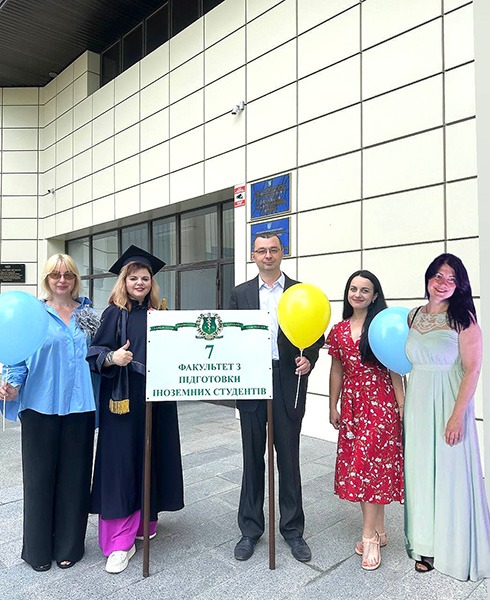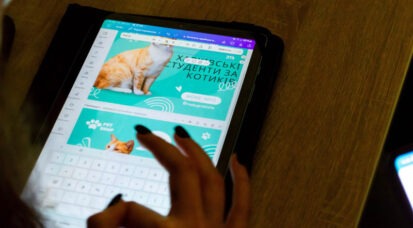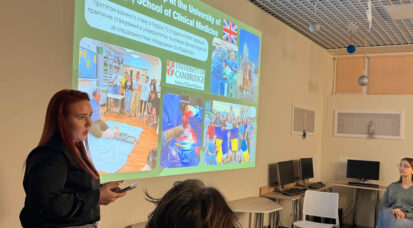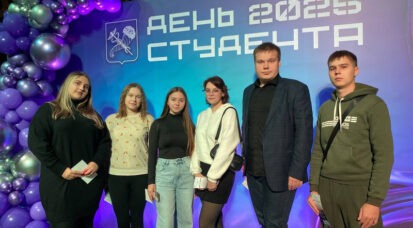Student feedback: «Happy are those who dream dreams and are ready to pay the price to make them come true»
“For every dream comes a price”. In my case, as an aspiring medical doctor, it was a six-year academic journey from the shores of Nigeria, spanning 8,268 km, landing me here in Kharkiv in the autumn of 2018. Upon arriving, I was greeted by the reddish-brown forests with falling leaves, a sight to behold though I wasn’t here for sightseeing. I settled into the hostel and adapted to the system with help from a supportive community of students. On my first day, I was amazed at the magnificent structure that stood over 25 feet tall, adorned with three large wooden doors, each with its own arc depicting the classical European architecture. To the left of the concourse was a sculpture of three racially diverse individuals. Above the entrance, the university’s emblem embroidered with the Latin motto “Valetudo est bonum optimum” — “Health is the greatest good” — greeted all who entered. My first-year experience was riddled with challenges of adaptation, figuring out the tripartite rail system, the location of the departments, and the everyday tests for each subject. But to ease our transition, there was a robust library architecture, a physical education class which was a moment of relief from the rigorous academic activities, and extracurricular activities like the culturally inclusive Christmas concert, which was my highlight of the year.
As a second-year student, I had now understood the rail network system but was still falling short with the bus system. With a near-perfect integration of the transport network on Google Maps, it was easier to get by. But that was the least of my worries as anatomy and histology exams were fast approaching with a vast volume of study materials to cover. I thought to myself, this must surely be the hardest part of med school, oblivious to the smirking pathology and pharmacology in the corner waiting to pounce. Before the end of our 2nd year, the news of the Covid-19 disease hit, and just like that, it graduated to a pandemic. A lockdown was implemented, and then the idea of onsite study became impossible. With quick thinking and implementation, we transitioned to a distant learning mode of study. But as days turned to months, it became evident that the physical presence of our teachers and classmates contributed to the holistic concept of education. We missed the sound of “stantsia naukova” every time we were about to alight from the train and the seven-minute walk to the university, sometimes shortened to about two minutes depending on how much time you had left before the start of your class/lecture, as lateness could be rewarded with an instant jab of a class repeat, popularly known as a “work off”. The long queues at the entrance of the dean’s office, majorly trying to sign your kvatovska and other various activities.
Irrespective of mental and emotional side effects, as it is popularly said that time waits for no one, indeed it did not wait, as it was already the culmination of the third year, and our first exam from the Ministry of Health (KROK1) was fast approaching, so we had to put aside sentiments and focus on the task at hand, which was passing the exam. On the day of the exam, everyone showed up in their white coats. Despite our elation at seeing our classmates, all emotions were subdued beneath face masks and constrained by social distancing measures. The third year was indeed my most memorable year.
The fourth year was a time of recovery from the effects of the pandemic, and we anticipated a return to normalcy, only for the process to be short-lived by the echoes of war, leaving everyone with one goal: survival. Although it was a time of uncertainty, one thing became clear: our stay in the breadbasket of Europe was coming to an end. What the pandemic couldn’t do, in that we didn’t stop academic activities, had prepared us for the academic aftermath of the war. All we were left with were memories of a life we would most likely not experience again and the nostalgia of an alien land turned home away from home. It was a month-and-a-half-long recess, but soon enough academic activities resumed due to our robust architecture for distance learning, reaching thousands of students in over 4 continents of the world. From the echoes of war was birthed a phrase: “Slava Ukraini,” which translates to “Glory to Ukraine,” embodying the fighting spirit of the Ukrainian people. But I say “Slava Ukraini” doesn’t just represent the undying will and relentless spirit of the Ukrainians but its influence on a myriad of unique individuals from diverse cultures and its impact on us with that spirit of resilience. At the end of our studies at KhNMU, we successfully passed KROK2 and OSKI final exams. My sincere gratitude goes to our teachers and all in the administrative system led by our Oksana Vasylieva and Pavlo Korobchanskyi.
In conclusion, I have learned through my time here that nothing can truly stop you much more than you can! So to all my fellow graduates, carry the consciousness that you have been forged in fire and You’re gold! Go and change the world.
Oyewo Pamilerin Elisha Grp 16 7th faculty, Nigeria

